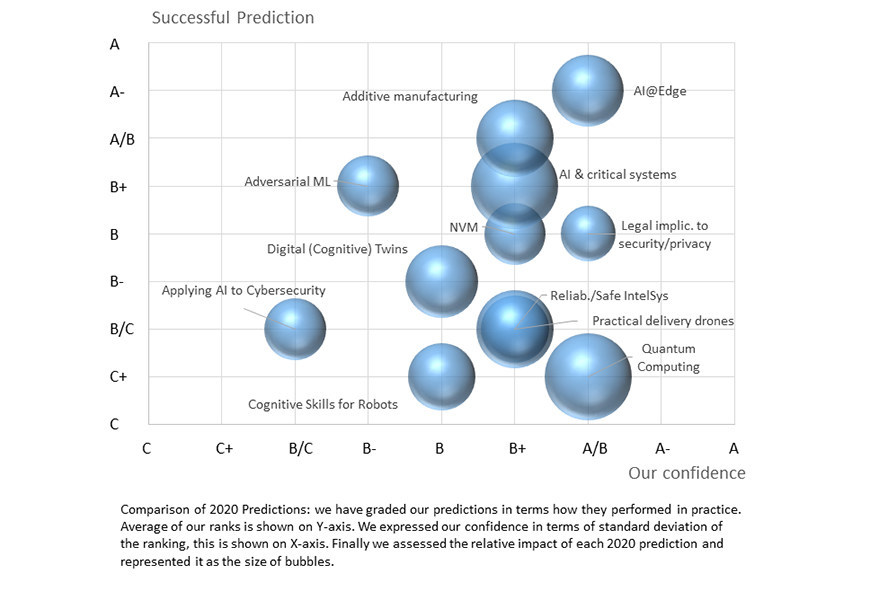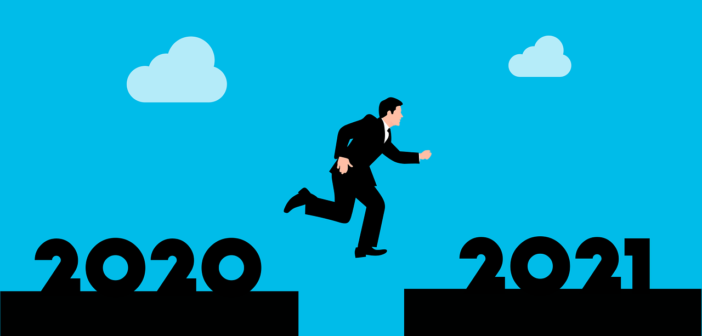The IEEE Computer Society revealed the scorecard for its 2020 Technology Predictions, which were published in Computer magazine’s December 2019 issue. The 2020 Technology Predictions garnered a collective grade of B-.

“Last year was the least predictable of all years for which we have conducted technology predictions, and—not surprisingly—our grade was B-,” said Dejan Milojicic, former IEEE CS president (2014) and current Distinguished Technologist at Hewlett Packard Labs. “The advancement of most technologies slowed due to the ongoing pandemic, but then a few were actually accelerated.”
The highest grades were given to AI@Edge, additive manufacturing, adversarial machine learning (ML), and artificial intelligence (AI) and critical systems:
- AI@Edge (graded A-) was driven by the need to automate and filter data close to the edge by applying AI; it was critical in collecting pandemic-related information.
- Additive manufacturing (graded A/B) helped produce critical medical components and provided evidence that distributed, local manufacturing capabilities can be essential during times of supply-chain upheaval.
- Adversarial ML (graded B+) was increasingly used as systems continue to incorporate ML, in particular through variants of reinforcement learning and neural networks.
- AI and critical systems (also graded B+) were deployed increasingly in more systems that affect public health, safety, and welfare.
All 2020 Technology Predictions and Grades
|
1 |
AI@Edge (A-). Not surprisingly, the adoption of AI at edge dominated the predictions in 2020. |
|
2 |
Additive manufacturing (A/B). The bulk of our predictions for additive manufacturing proved valid in 2020. |
|
3-4 |
Adversarial ML (B+). We correctly predicted that adversarial ML would become increasingly important in 2020. |
|
3-4 |
AI and critical systems (B+). We predicted that AI would be deployed in more systems that affect public health, safety, and welfare (as opposed to, for example, entertainment systems) over the next five years. |
|
5 |
Non-volatile memory products, interfaces, and applications (B). Non-volatile memory enables next-generation computing in the data center, at the edge, and embedded in industrial and consumer products. |
|
6 |
Legal and related implications to reflect security and privacy (B). We predicted that legal and policy responses to security and privacy concerns would continue to demand the attention of engineers, the public, and policymakers. |
|
7 |
Digital Twins, including Cognitive Twins (B-). Digital Twins are now mainstream in business, particularly in the manufacturing area with availability of industrial platforms to support them (GE and Siemens are main players in this area). |
|
8 |
Reliability and safety challenges for intelligent systems (B/C). Intelligent systems, which are capable of making autonomous decisions based on AI algorithms, are becoming increasingly widespread in several application fields (for example, autonomous robots and vehicles). |
|
9 |
Applying AI to cybersecurity (B/C). We expected that AI/ML would start being widely adopted in cybersecurity and even envisioned broad participation of industry, government, and academia. |
|
10 |
Practical delivery drones (B/C). Our team is largely in consensus that the promise of practical delivery drones hasn’t panned out during 2020. |
|
11 |
Cognitive skills for robots (C+). We predicted that recent breakthroughs in large-scale simulations, deep reinforcement learning, and computer vision collectively would bring forth a basic level of cognitive abilities to robots that would lead to significant improvements of robotic applications. |
|
12 |
Quantum computing (C+). Quantum computing gained tremendous visibility in 2020. |
Visit the IEEE CS 2020 Scorecard to view the complete analysis and evaluation for each prediction.
The authors’ collective rating for the 2020 predictions resulted in a grade of B-, which was a bit lower than the 2019 and 2018 B grades, and lower still than the 2017 A- grade.
Image licensed by Pixabay.com
Related News:
Avast and Borsetta Join Intel in Launching the Private AI Collaborative Research Institute

